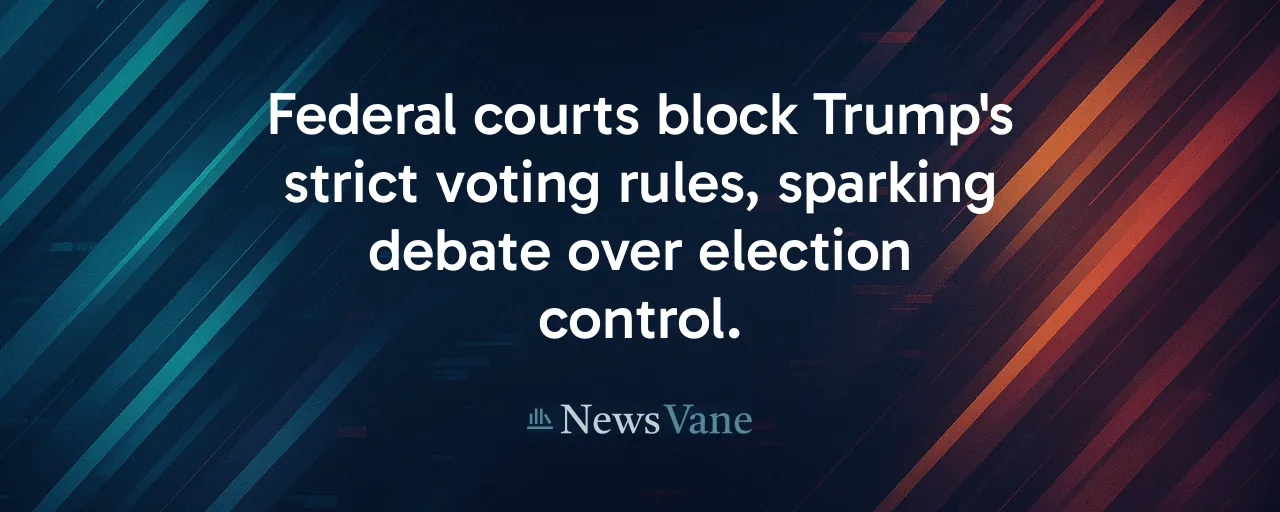A Battle Over Election Control
Voting lies at the core of American democracy, but a recent executive order from President Donald Trump has sparked intense debate about who gets to set the rules. Signed in March 2025, the order aimed to enforce strict voter registration requirements, like proving citizenship, and set a uniform Election Day deadline for counting ballots. Federal courts have now stepped in, blocking key parts of the directive after fierce legal pushback.
On June 13, 2025, a Massachusetts district court issued a preliminary injunction, stopping provisions that advocates for state election autonomy said would upend state election systems. California Attorney General Rob Bonta, leading a group of 19 state attorneys general, filed a lawsuit in April, arguing the order exceeded presidential powers and clashed with the Constitution's framework for state-led elections. The ruling highlights a growing struggle between federal goals and local control.
What the Order Aimed to Do
Titled 'Preserving and Protecting the Integrity of American Elections,' Trump's order sought to address fears among some voters about election fairness. Backers, including policy groups like the Heritage Foundation, claim measures such as proof-of-citizenship rules are vital to stop non-citizen voting, though such cases are scarce, with fewer than 40 federal prosecutions since 2016. The order also threatened to cut federal funds from states that resisted these changes, a clause now on hold due to court action.
Supporters cite a January 2025 NPR/Ipsos poll showing 70 percent of Republican voters favor stricter national rules. They view the order as a way to restore trust, with advocates like elections lawyer Cleta Mitchell rallying for consistent standards. Civil rights groups counter that these rules could block millions from voting. Data suggests up to 11 percent of eligible voters lack easy access to documents like birth certificates or passports.
States Defend Their Turf
The U.S. Constitution gives states the main role in running elections, a system rooted in federalism. With 7,000 jurisdictions and 89,000 local governments, this setup allows flexibility but can breed distrust across state lines. The 19 state attorneys general argued in their lawsuit that Trump's order unlawfully demanded state resources and violated the Elections Clause, which assigns election oversight to state legislatures and Congress.
Courts have upheld this view so far. In Massachusetts, Judge Denise Casper found a strong chance the states would win their case, pausing rules on ballot deadlines and funding penalties. A Washington, D.C., court earlier blocked orders forcing the Election Assistance Commission to impose citizenship checks. Since March, four district courts have issued temporary blocks, and the Supreme Court has reviewed three emergency appeals, showing a fast-moving judicial response.
Tensions Over Voting Access
The executive order has brought larger questions about voting access to the forefront. Civil rights organizations, such as the ACLU and Brennan Center, have filed 18 lawsuits since March, warning that strict documentation rules could lower turnout, particularly among naturalized citizens and lower-income voters. Research indicates these requirements cut new registrations by 2 to 7 percent, effects similar to historical obstacles like poll taxes.
Meanwhile, advocates for stricter rules, including House Republicans who passed the SAVE Act in April 2025, argue that national standards are needed to boost confidence in elections. They highlight rare fraud cases to justify their stance. Bipartisan researchers offer another approach: federal funds to support state-chosen policies, like online registration or post-election audits, balancing local control with shared goals.
The Road Ahead
Legal fights are set to continue. The Department of Justice has appealed two court blocks, with hearings scheduled for September 2025 in the First and D.C. Circuits. Many expect a Supreme Court case in early 2026, which could redefine election oversight. For now, states hold their ground, but the clash over federal authority persists.
This dispute raises a core issue: how to ensure secure elections while keeping voting accessible in a divided country. Courts have questioned broad executive moves, yet public skepticism, with only 28 percent of voters trusting results from states led by the opposing party per 2024 surveys, calls for answers. Progress may depend on states and federal leaders finding common ground, respecting local systems and democratic values.
For most people, voting decides local schools, taxes, and community priorities. As legal and political battles play out, the goal remains clear: a system where every eligible voter can participate, free from undue hurdles, reflecting the nation's diverse needs.
